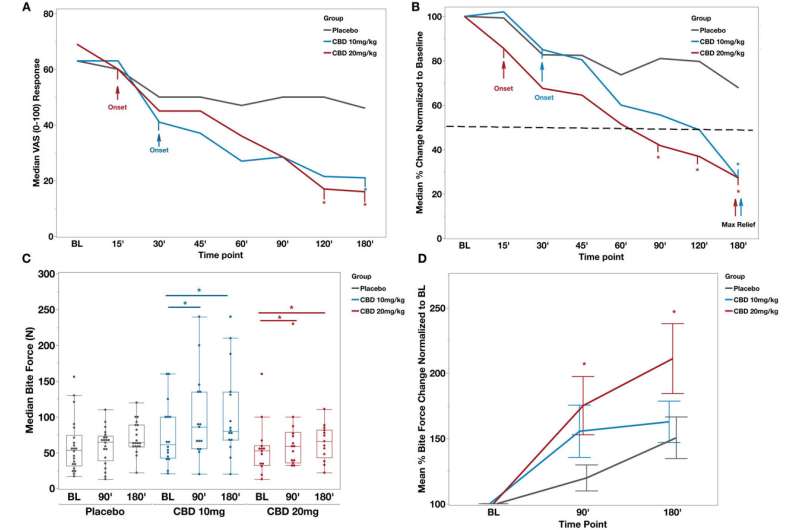This article has been reviewed according to Science X's editorial process and policies. Editors have highlighted the following attributes while ensuring the content's credibility:
fact-checked
trusted source
proofread
Marijuana component offers opioid alternative by effectively treating dental pain

In a recent study that could revolutionize dental pain management, Rutgers researchers have found that cannabidiol (CBD)—the non-addictive marijuana derivative—alleviates acute dental pain.
This first-of-its-kind result appears in the Journal of Dental Research and indicates that CBD, which produces no "high" among users, may be an equally effective but far safer alternative to addictive opioid painkillers.
"The first line of defense for dental pain has always been anti-inflammatory medications like acetaminophen (Tylenol), ibuprofen (Advil, Motrin) or naproxen (Aleve), but many patients can't take such medications or can't get sufficient relief from them, so dentists have traditionally been among the largest prescribers of opioid medications, either alone or in combination with these other medications," said lead study author Vanessa Chrepa, an associate professor at the Rutgers School of Dental Medicine and director of clinical and translational research at the school's department of endodontics.
"The rise in opioid-related addiction and death has everyone looking for better alternatives, things that can alleviate serious pain without hurting so many patients. Much of that research has focused on another component of cannabis called THC, but THC is psychoactive. It gets users high and has other negative effects. We studied cannabidiol or CBD because previous research from other specialties suggested that it might relieve dental pain without any psychoactive effects, which is really what everyone wants to find."
The clinical trial involved 61 participants with severe tooth pain who were randomly assigned to receive either one of two doses of an FDA-approved pure CBD solution called Epidiolex or a placebo. Researchers monitored patient pain levels for three hours with a visual analog scale (VAS), a standard tool for assessing pain intensity.
Both CBD groups reported substantially more pain reduction than did the placebo group. About 85 percent of CBD users reported at least a 50 percent reduction in their initial pain, and both CBD groups reached a median 70 percent reduction in pain.
Another key finding of the study was the increase in bite force among participants who received CBD, which suggests the compound improved tooth function and thus may prove particularly beneficial for those with dental pain that affects their ability to chew.
Side effects like sedation, diarrhea and abdominal pain occurred more frequently in the CBD groups than the placebo group. There were, moreover, limitations to the study, including the small sample size, and suggest that more extensive research is necessary to confirm these findings and explore the broader applications of CBD in pain management.
Plans for a larger-scale phase III clinical trial are underway, aiming to build on these promising results and fully elucidate CBD's safety profile for treating dental pain.
"There are more things to study with follow-up research. Can CBD be used to manage postoperative pain for patients who have undergone tooth extraction or root canal? Can we get even better pain relief by combining it with other agents like Tylenol?" Chrepa said.
"That said, the results of this study are strong enough to make a compelling case to use pure CBD like Epidiolex for dental pain. A larger phase 3 trial will be the next step to get FDA approval for Epidiolex or other pure CBD solutions to use for dental pain management. I am looking forward to translating this into common practice. It will tremendously help patients with acute toothache and possibly other acute inflammatory pain conditions."
More information: V. Chrepa et al, Cannabidiol as an Alternative Analgesic for Acute Dental Pain, Journal of Dental Research (2023). DOI: 10.1177/00220345231200814




















